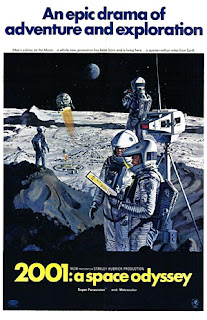3. 2001: A Space Odyssey

1968, UK/USA D: Stanley Kubrick
The first time I saw Stanley Kubrick’s masterpiece was the ideal way to first encounter it: it was in a theater, I was 12 years old, and I had no idea what it was about. Of course, after I exited the theater, I still had no idea what it was about. But I knew that I had just experienced something that would forever change not only the way I viewed cinema, but the way I viewed reality. There’s a very short list of movies that can do that.We have to remember that when 2001 was first released, we hadn’t even landed on the moon yet. There were no computer graphics to astound us. Kubrick’s vision of space in the near future was mind-bogglingly realistic and immediate. But it went further than that. God, did it go further than that!
First of all, the whole first section of the movie was about grunting ape-men. What was with that? And what was that huge object that suddenly appeared among them? Next thing you know, we’ve flashed to the future and they’ve discovered the same damn thing on the moon. What the . . .?
And the ending? What was happening here? Yes, it was mind-blowing and colorful. This was a trip I never even got on drugs. And he ends up in a room eating dinner?
Kubrick’s co-writer, Arthur C. Clarke wanted to clear up what Kubrick wanted to keep oblique, and when I read his novelization of the film, it answered a lot of questions I had, but it destroyed some of the mystery. I truly wish I had never read it and would have been forced to puzzle the whole thing out for myself - the movie had so much more power when I only had Kubrick’s images to chart my course.
But that doesn’t mean the film is no longer enigmatic! Kubrick’s silence of space is like the silence of God. At the end, when the earth is seen next to the giant embryo, and we hear Also Sprach Zarathustra one last time, is this a celebration of our infinite potential for evolution? Or is it a cynical portrait of determinism and cosmic meaninglessness? Believe me, I’ve read plenty of articles over the years arguing both ways. And there’s no way Kubrick was going to add a word of explanation.
I could go on forever about the devastating power of the imagery. That’s all obvious. Anyone who’s ever seen the film knows all about that. (And it all still holds up!) If that’s all the movie were, it would still be one of the greatest landmarks in cinematic history.
No, what truly gives the movie its endless power is its eerie emptiness, its matter-of-fact acceptance of the extraordinary. It’s so strange to watch the dull, banal humans utterly unaffected by this miraculous universe - and their own presence in it - while you sit there in shock and reverent awe.
It took me a long time to realize it, but the real center of the film is HAL. This computer, this marvel of artificial intelligence just may be superior to us, and therefore just may have the right to succeed us on our evolutionary path. That is the cold and scary truth.
2001: A Space Odyssey is the one movie you can put right up there next to the pyramids and the Sphinx as one of the great, mind-bending achievements of humankind. In short, it’s a monolith.
+
No comments:
Post a Comment